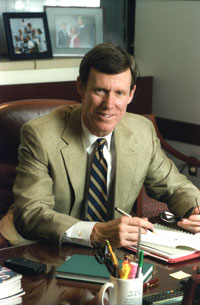|
|||||||||||||||||||||||||||||||||||
 |
|||||||||||||||||||||||||||||||||||
|
|
|||||||||||||||||||||||||||||||||||
|
|
Message from the Dean
World events during 2002 present important challenges to the health of all people. Terrorism persists around the globe, and threats of bioterrorism are affecting health policy and research. Rates of infectious diseases such as AIDS continue to climb, particularly in developing nations. In the United States, economic problems are creating unemployment and limited access to health care for many people. In the context of these concerns, health professionals and scientists are able to assist in many ways. They are answering the call to protect populations fro m bioterrorism with readiness plans, education, development of new drugs, and other means. In the current economy, as the percentage of people without health insurance increases, care for the uninsured and underinsured becomes even more important. While meeting these and other pressing needs, clinicians and researchers at medical schools and teaching hospitals, including our own, remain dedicated to advancing science and improving health for people in the United States and throughout the world. The hard work and talent of UW Medicine faculty have led to the establishment of several new centers to pursue research with potential for improving health. Research in genome sciences, including work on illness-causing pathogens in equatorial regions, is expanding rapidly at the UW. Long a recognized center for the neurosciences, this past year the UW furthered research on neurological and neuropsychiatric disorders. New studies of the immune system have become important in understanding many types of chronic illness, including arthritis. The UW Medicine Regional Heart Center has become a leader in preventing and treating heart disease in men and women. In many other areas, outstanding research continues at the UW. Research grants awarded to UW Medicine faculty increased this past year to a total of approximately $600 million. The UW School of Medicine also is proud of its students who conduct research and provide public service for the people of this region and other parts of the world. Student interest in international health research and service is high. In the northwest, large numbers of students are pursuing community-based service projects in the small towns or inner city neighborhoods where they train. Student public service groups, such as the Community Health Advancement Program (CHAP), Student Providers Aspiring to Rural and Underserved eXperiences (SPARX), and the International Health Initiatives Programs all have many enthusiastic student participants. As part of the curriculum changes implemented this year, the School of Medicine has instituted a new system of colleges to focus on clinical skill development and enhance personalized education. Students have been grouped into five colleges named after natural assets of the region: Denali, Wind River, Big Sky, Snake River, and Rainier. The faculty of the colleges will play a major role throughout the students’ medical school experience by helping students acquire and strengthen clinical skills and serving as the students’ advocates and counselors. The college faculty report strong enthusiasm for the increased attention to clinical skills and patient-centered care. The changes in our world have created a pressing need for clinicians trained and committed to providing excellent medical care under a variety of circumstances. UW Medicine is responding to the need for high quality medical education combined with emphasis on the service ethic required of physicians. After the September 11 attacks, UW physicians, nurses, their families and others spontaneously offered to help with open hearts and willing hands. These same individuals continue to contribute to efforts to ensure the safety and health of all people. This generosity of spirit is characteristic of the students, faculty, staff and volunteers of UW Medicine.
|
||||||||||||||||||||||||||||||||||
|
About the Report | About UW Medicine | Research | Community Service | Outreach | Clinical Leadership | Education | Past Events | Private Support | Related Links © 2002 - 2003 UW Medicine Maintained by UW Health Sciences and Medical Affairs Office of News and Community Relations Send questions and comments to drrpt@u.washington.edu |
|||||||||||||||||||||||||||||||||||











